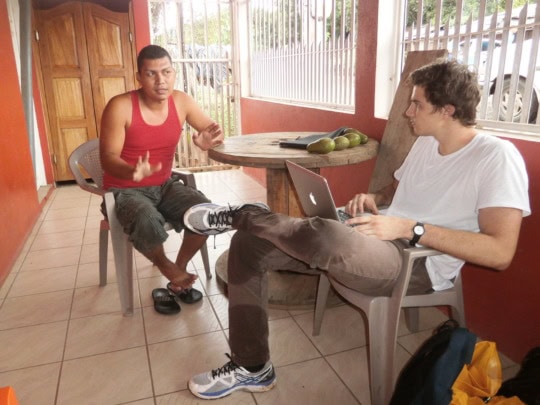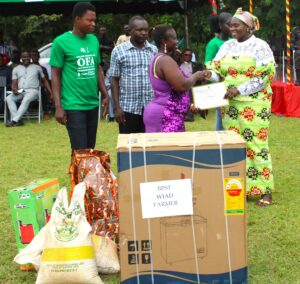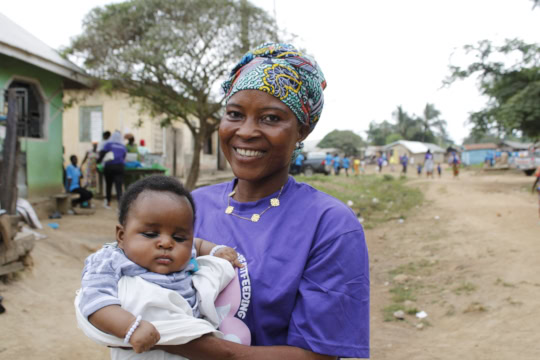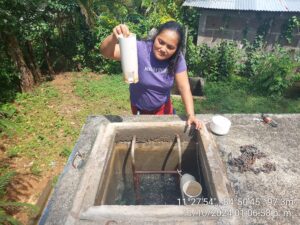No More Dengue Fever in El Tule

Clean water gives Aunner’s son a healthier future
In a majority of Nicaraguan communities, the CAPS (Comité de Agua Potable y Saneamiento — Water Sanitation Committee) leaders typically range in age from late thirties to early sixties. In El Tule, a village in the municipality of San Carlos, the president of the CAPS group, Aunner Alfredo Ramírez, just turned 29. His personality is a mix of youthful fervor with grounded wisdom. Eighteen months ago, he successfully lobbied his community of El Tule to partner with Self-Help to install a CTI-8 water chlorinator. We visited him recently to find out what changes he has seen in his community of 785 residents since the installation of the chlorinator in mid-2014.
When asked about the quality of the water conditions prior to installing the chlorinator, Aunner got a look of disgust on his face and replied, “It was completely dirty and full of sediment – the communal water storage tank was open to insects, the air, animals, and dirt… Many people here knew about it, but thought they were immune to everything.” This mentality changed soon after a dengue fever outbreak in the houses surrounding El Tule’s water storage tank. The water tank provided masses of mosquito larvae with an ideal open water source to thrive and grow in, causing a dengue epidemic throughout the town. Dengue symptoms are comparable to malaria, including high fever and extreme exhaustion.
Recognizing the immediate need to address the problem, Aunner called a town-wide meeting to address the issue, rallying the unanimous support of the community to purchase a water purification system. Not long before, Aunner had attended a demonstration of the CTI-8 water chlorination system by Self-Help International’s Clean Water Program Officer, Orlando, and the townsfolk agreed that out of all available options to improve the water quality, the CTI-8 was the most affordable and effective. Aunner explains, “The system is super affordable, because it functions via gravity, not electricity like most chlorinators… incorporating the cost of the chlorine tables, each house pays around one Cordoba per month (roughly USD $0.04).”

Aunner tells intern Mack how clean water changed El Tule
After consuming impure water for so long, it takes the body a brief adjustment period to acclimate to consumption of chlorine-treated water. Aunner emphatically explained, “Even though it took people in El Tule a week or two to get used to it, everyone says the water here now tastes great and is 1000 times better than it was before!” The change was drastic within the community. Aunner cited the CTI-8 installation as a necessary foundation for El Tule’s development as a whole, saying, “It’s indispensable to life – to wash, to cook, to clean, to drink, to do everything.”
The water purification initiative took time, energy, and resources to unite the people toward a common goal, but when asked how the efforts have most impacted him and his family, Aunner stated, “My entire family’s quality of life is better; mine, my wife’s, and my son’s. I know without a doubt my kids will have a better future because of their water.”
El Tule serves as an example to surrounding villages, demonstrating the communal health benefits of access to potable water. Still, a large portion of these neighboring villages suffer constant sickness from ingesting untreated water – Aunner states that there is still a large education initiative that needs to take place throughout the region. “What you guys [Self-Help International] are doing is excellent… We need to work create a greater awareness of the importance of purified water, either by holding assemblies or going house to house.”
Aunner continues to spread the significance of the water chlorinator’s effects to those in nearby areas, sharing his personal testimony as a beneficiary of the CTI-8 water technology.
Thanks to the tireless support of community leaders like Aunner, and financial support from donors like you, Self-Help has ensured that 58,000 people in 60 Nicaraguan communities have regular access to clean, safe drinking water. We aim to reach 75,000 by the end of this year, but we can’t do it without you!




